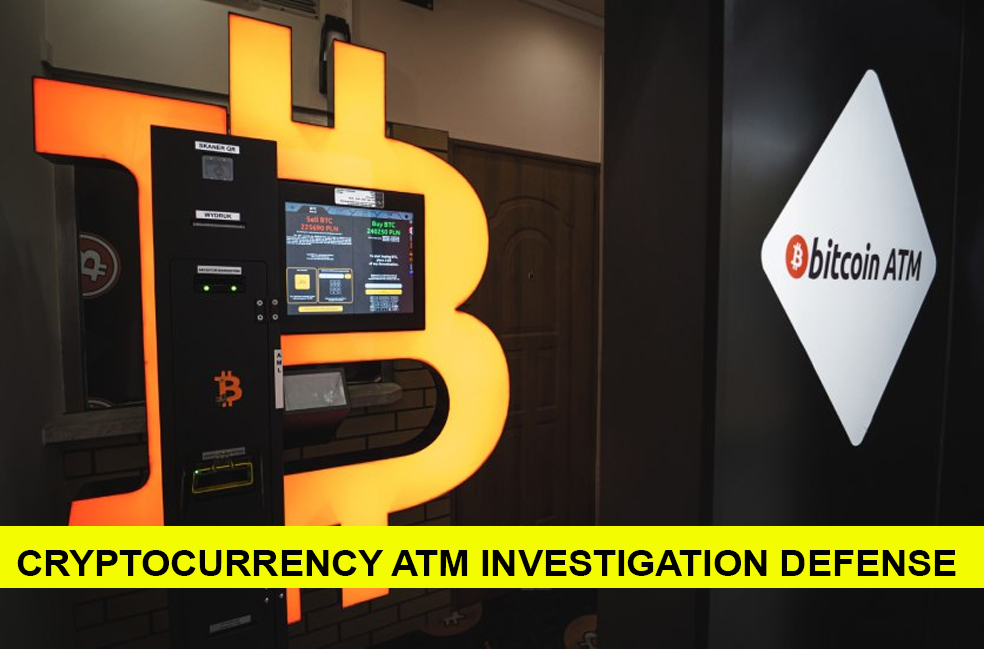Cryptocurrency ATM Investigation Defense

Cryptocurrency ATM Investigation Defense, Bitcoin and other cryptocurrency ATM operators are under the microscope. The U.S. Department of Justice (DOJ) and U.S. Attorney’s Offices across the country have obtained multiple indictments against these operators in recent years—in many cases pursuing multiple charges for an extensive list of federal offenses.
While there is nothing inherently unlawful about operating a cryptocurrency ATM, Bitcoin ATM networks and other similar types of businesses are subject to numerous federal statutory and regulatory requirements. When they fail to meet these requirements, the DOJ and U.S. Attorneys are taking aggressive action to enforce compliance. Here are two recent examples:
- California Man Sentenced to 24 Months in Federal Prison for Operating Illegal Bitcoin ATM Network – After pleading guilty to charges of money laundering, operating an unlicensed money transmitting business, and failing to maintain an effective anti-money laundering program, a California man was sentenced to 24 months in federal prison. According to a DOJ press release, the former bank employee intentionally failed to register his Bitcoin ATM business with the Financial Crimes Enforcement Network (FinCEN), and knowingly conducted currency exchanges involving the proceeds of criminal activity.
- Coindawg Founder Arrested for Using Cryptocurrency ATM Business to Launder Fraudulent SBA Loans – The U.S. Attorney for the Southern District of New York recently announced the arrest of a man who is accused of executing a scheme to launder $1 million in fraudulent SBA loans. According to a press release, the founder of Coindawg is accused of converting the bulk of the $1 million in federally secured funds to Bitcoin and using the rest to start a “lucrative cryptocurrency ATM business” that charged a 15% transaction fee. He is facing charges including theft of public money, interstate receipt of stolen money, and conspiracy to commit money laundering—all of which carry 10 years or more of federal imprisonment.
Potential Charges in Federal Cryptocurrency ATM Investigations
In federal cryptocurrency ATM investigations, both companies and individuals can face a broad range of charges. Defending against these charges requires a skilled and proactive approach, and it requires intimate familiarity with the Bank Secrecy Act (BSA) and the multitude of other federal laws that may apply. At Oberheiden P.C., our lawyers (including our former DOJ prosecutors and U.S. Attorneys) have the skills and knowledge required to effectively defend clients in high-stakes federal cryptocurrency ATM and other blockchain matters.
Some examples of potential charges in federal cryptocurrency ATM investigations include:
Operating an Unlicensed Money Transmitting Business
“Money transmitting businesses” are subject to licensing requirements under federal law. Bitcoin and other cryptocurrency ATMs qualify as money transmitting businesses under 18 U.S.C. Section 1960(b)(2), as the definition of “money transmitting” includes “transferring funds on behalf of the public by any and all means including but not limited to transfers within this country or to locations abroad by wire [or other means].” Under 18 U.S.C. Section 1960(a), operating an unlicensed money transmitting business carries statutory fines and up to five years of federal imprisonment.
Failure to Maintain an Effective Anti-Money Laundering Program
Under the BSA, any financial institution or “nonfinancial trade or business” that conducts financial transactions is required to maintain an effective anti-money laundering (AML) program. This entails substantial burdens—including several federal reporting requirements. Depending on the specific violations involved, failure to meet the federal AML program requirements can carry a broad range of fines and prison terms ranging from years to decades.
Money Laundering
The federal crime of money laundering is defined in 18 U.S.C. Section 1956. Under this statute, cryptocurrency ATM operators can face prosecution if they conduct or facilitate transactions that they know (or should know) involve funds obtained from criminal activities. Regardless of a company’s or individual’s specific role in conducting or facilitating a transaction, money laundering charges carry up to 20 years in prison and a fine of “$500,000 or twice the value of the property involved in the transaction, whichever is greater.”
Interstate Receipt of Stolen Money
Receiving stolen money through a cryptocurrency ATM (including receiving transaction fees from currency exchanges) is a federal crime under 18 U.S.C. Section 2315. Violations of Section 2315 carry statutory fines and up to 10 years of federal imprisonment in most cases.
Conspiracy to Commit Money Laundering and Other Federal Crimes
Individuals who are involved in conducting illicit transactions through cryptocurrency ATMs, who operate unlicensed Bitcoin ATM networks, and who fail to meet the federal AML requirements can also face a variety of other federal charges. These include conspiracy charges under 18 U.S.C. Section 371, among others. While the penalties for these offenses vary, individuals targeted by the DOJ or a U.S. Attorney’s Office in a cryptocurrency ATM investigation can generally expect to be facing hundreds of thousands of dollars in fines and years of federal imprisonment—if not significantly more.
Defending Against a DOJ or U.S. Attorney’s Office Investigation Targeting Bitcoin ATMs
Again, these are just examples. When facing a federal cryptocurrency ATM investigation, it is imperative to ensure that you have a clear understanding of the specific charges that are on the table. This requires experienced legal representation; and, to protect yourself (and your company) to the fullest extent possible, you need to speak with an experienced defense lawyer right away.
At Oberheiden P.C., our career federal defense lawyers and former federal prosecutors have the experience required to effectively defend individuals and companies targeted for operating unlicensed cryptocurrency ATMs and illegal Bitcoin ATM networks. When you contact us about your (or your company’s) investigation, we will:
- Intervene in the DOJ’s or U.S. Attorney’s Investigation – As soon as you engage our firm, we will intervene in the DOJ’s or U.S. Attorney’s investigation. This will slow down the process and provide the time needed to execute a strategic defense.
- Identify the Specific Charges that Are on the Table – Through the process of intervening in the investigation, we will identify the specific charges that are on the table. Once we know what you need to defend against, then we can formulate an effective defense strategy.
- Evaluate Your Defense Options – Identifying the specific allegations at issue will allow our lawyers to evaluate your defense options. With all of the charges listed above (among others), there are numerous ways to fend off federal charges. But, choosing the right strategy requires a clear understanding of the circumstances at hand.
- Execute a Targeted Defense Strategy Focused on Pre–Indictment Resolution – After evaluating your options, we will build and execute a targeted defense strategy. As long as the government’s investigation is still pending, this strategy will generally focus on resolving the matter without an indictment.
- Represent You and Your Company in Court as Necessary – If it is not possible to avoid an indictment, we will represent you and your company in court. We have extensive experience representing clients at the pre-trial and trial phases, and we have succeeded in getting clients’ charges dismissed prior to trial in many cases.


















